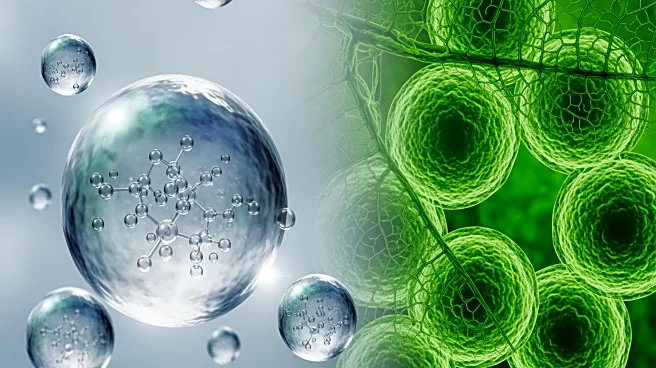What's Happening?
Recent research has investigated the use of chitosan nanoparticles (CNP) to enhance the expression of the h6h gene and increase tropane alkaloid production in Hyoscyamus reticulatus hairy roots. The study
confirmed the transgenic nature of these roots by identifying specific gene sequences transferred from Agrobacterium rhizogenes. The application of CNP was found to significantly affect the growth and biomass production of the hairy roots, with varying concentrations impacting fresh and dry weights. Additionally, CNP influenced the total phenol and flavonoid content, as well as antioxidant capacity, with higher concentrations leading to increased production of these compounds. The research also highlighted the role of CNP in boosting antioxidant enzyme activity, which is crucial for plant defense against oxidative stress. Furthermore, the study demonstrated that CNP treatment significantly increased the expression of the h6h gene, which is vital for the biosynthesis of tropane alkaloids like scopolamine and hyoscyamine.
Why It's Important?
The findings of this study are significant for the pharmaceutical industry, as tropane alkaloids such as scopolamine and hyoscyamine have commercial value due to their medicinal properties. Enhancing the production of these alkaloids through biotic elicitors like chitosan nanoparticles could lead to more efficient and cost-effective methods for producing these compounds. This research also contributes to the understanding of how nanoparticles can be used to manipulate plant metabolic pathways, potentially leading to advancements in agricultural biotechnology. The ability to increase the yield of valuable secondary metabolites could benefit industries reliant on plant-derived compounds, offering new avenues for drug development and agricultural innovation.
What's Next?
Future research may focus on optimizing the concentration and application methods of chitosan nanoparticles to maximize alkaloid production. Additionally, exploring the mechanisms by which CNP influences gene expression and metabolic pathways could provide deeper insights into plant biotechnology. There is potential for expanding this approach to other plant species and secondary metabolites, which could further enhance the commercial viability of using nanoparticles in agriculture and pharmaceuticals. Stakeholders in the pharmaceutical and agricultural sectors may consider investing in this technology to improve production processes and reduce costs.
Beyond the Headlines
The use of chitosan nanoparticles raises ethical and environmental considerations regarding the application of nanotechnology in agriculture. While the benefits of increased alkaloid production are clear, the long-term effects of nanoparticle use on ecosystems and human health require careful evaluation. Regulatory frameworks may need to adapt to address these concerns, ensuring that advancements in biotechnology are implemented responsibly. Additionally, the cultural implications of genetically modifying plants for commercial purposes may spark debates about the balance between innovation and natural preservation.








